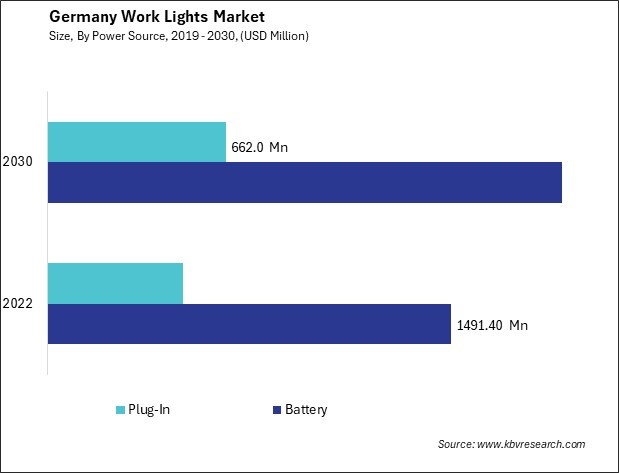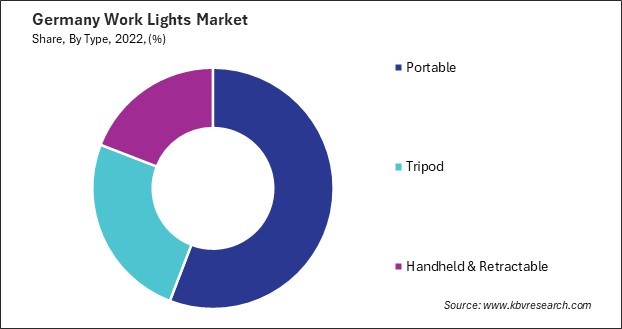Germany Work Lights Market Size, Share & Trends Analysis Report By Power Source, By Type (Portable, Tripod, Handheld & Retractable), By Light Technology (Halogen, Integrated LED, and Fluorescent), By End-Germanye, and Forecast, 2023 - 2030
Published Date : 17-May-2024 |
Pages: 57 |
Formats: PDF |
COVID-19 Impact on the Germany Work Lights Market
The Germany Work Lights Market Market size is expected to reach $2.6 Billion by 2030, rising at a market growth of 3.3% CAGR during the forecast period. In the year 2022, the market attained a volume of 31905.9 thousand units, experiencing a growth of 3.8% (2019-2022).
The work lights market in Germany has experienced significant growth and evolution in recent years, driven by the country's robust industrial sector and a focus on workplace safety. Germany, being a powerhouse in manufacturing and engineering, has a high demand for efficient and reliable lighting solutions across various industries such as automotive, construction, and manufacturing. The nation’s commitment to environmental sustainability has influenced the adoption of energy-efficient lighting technologies.

Government initiatives supporting energy efficiency and sustainable practices also impact the work lights market. Incentives for German businesses to adopt eco-friendly lighting solutions and comply with energy conservation measures play a role in shaping companies' purchasing decisions across various sectors. This aligns with Germany's commitment to reducing carbon emissions and fostering a greener industrial landscape.
The COVID-19 pandemic had an impact on the work lights market in Germany. The restrictions and disruptions caused by the pandemic led to a temporary slowdown in manufacturing activities and construction projects. However, the focus on workplace safety and the need for well-lit workspaces became even more pronounced during the pandemic, driving continued demand for high-quality work lights. As businesses adapt to the new normal, there is a heightened awareness of the role proper lighting plays in maintaining a safe and productive work environment, contributing to the resilience of the work lights market in Germany.
Market Trends
Rising adoption of LED technology
In Germany, the work lights market is undergoing a significant transformation driven by the rising adoption of LED technology. LED lights consume considerably less energy compared to traditional lighting sources, contributing to reduced electricity costs and a smaller carbon footprint. This aligns with Germany's goal of transitioning towards a more sustainable and eco-friendly industrial landscape.
In the automotive sector, another cornerstone of the German economy, LED technology is gaining prominence in work lights for its versatility. Automotive manufacturing requires flexible and adaptable lighting solutions, and LEDs offer customizable options in color temperature and lighting angles. This adaptability is particularly valuable in automotive assembly lines where precision and attention to detail are paramount.
According to the Germany Trade & Invest in 2021, Germany is Europe's biggest automotive industry, number one in production and sales terms, accounting for around 25% of all passenger cars manufactured and almost 20% of all new registrations. In addition to its dominance in the automotive sector, Germany continues to exhibit technological prowess in various industries. Notably, there is a discernible trend in the rising adoption of LED technology within the work lights market across the country.
The longevity of LED lights is another compelling factor driving their popularity in Germany. With a significantly longer lifespan than traditional bulbs, LED work lights in Germany are perceived as a cost-effective solution. German businesses recognize the long-term financial benefits of reduced maintenance and replacement costs, further incentivizing LED technology adoption. Thus, Germany's work lights market is witnessing a transformative shift fueled by the widespread adoption of LED technology.
Increased awareness of health and safety practices
The work lights market in Germany has witnessed a significant surge in awareness regarding health and safety practices. German workplaces, known for their adherence to meticulous standards, have increasingly recognized the pivotal role of proper lighting in fostering a safe and healthy work environment. Companies are investing in adjustable and task-specific lighting solutions to cater to the diverse needs of their workforce.
Furthermore, the adoption of smart lighting systems is on the rise, enabling dynamic adjustments to suit specific work conditions and contributing to overall employee comfort and safety. German businesses increasingly recognize the correlation between proper lighting and reduced workplace accidents, emphasizing the long-term cost-effectiveness of investing in high-quality work lights. Moreover, adjustable lighting solutions enable German workers to customize their lighting conditions based on the nature of their tasks, promoting a healthier and more productive workspace.
Additionally, technological advancements have played a pivotal role in shaping the German work lights market. Integrating smart lighting solutions and Internet of Things (IoT) technologies allows for adaptive and customizable lighting systems. These innovations contribute to improved visibility and the creation of dynamic work environments that is tailored to specific tasks and individual preferences. Hence, Germany's work lights market has experienced a notable surge in awareness surrounding health and safety practices, with a growing emphasis on adopting smart lighting systems.

Competition Analysis
The work lights market in Germany is marked by a robust industry comprising various companies that cater to the diverse needs of businesses and individuals. One of the prominent players in the German work lights market is Osram, a renowned lighting technology company. Osram has a strong presence in Germany, offering a variety of work lights that combine innovative technology with energy efficiency. The company's commitment to sustainability aligns with the growing environmental consciousness in Germany.
Another key player in the German work lights sector, Hella, specializes in automotive lighting solutions. With a focus on quality and performance, Hella's work lights are widely used in Germany's automotive and industrial sectors. The company's long-standing reputation for reliability contributes to its success in the German industry.
In the competitive landscape, Brennenstuhl stands out as a leading provider of electrical products, including work lights. The company, headquartered in Germany, emphasizes user-friendly designs and durability in its range of work lights, addressing the practical needs of German consumers and businesses. Steinel, a German-based company, is recognized for its innovative lighting products, including work lights with advanced sensor technologies. These sensor-based lights enhance energy efficiency by responding to movement, catering to the German industry's demand for smart and eco-friendly solutions.
As LED technology continues to dominate the lighting industry, German companies like LEDVANCE contribute significantly to the work lights market. LEDVANCE, with its commitment to energy-efficient lighting solutions, offers a range of LED work lights that align with Germany's emphasis on sustainability and resource efficiency. Similarly, the German work lights market also sees participation from international players like Bosch, a globally renowned technology and services company. Bosch's work lights are designed with a focus on durability and performance, meeting the high standards expected by German consumers.
In the realm of portable work lights, Einhell, a German manufacturer, provides a diverse range of products catering to DIY enthusiast's and professionals' needs. The company's presence in the German industry is characterized by its focus on affordability and practicality, making it a popular choice for various applications. Each company brings its unique strengths, whether technological innovation, sustainability initiatives, or a focus on practicality, contributing to the vibrant and evolving nature of the German work lights market.
List of Key Companies Profiled
- Bayco Products, Inc.
- Peterson Manufacturing, Inc.
- Ericson Manufacturing Company
- Scangrip A/S (Hultafors group)
- KIRA Leuchten GmbH
- Hugo Brennenstuhl GmbH & Co Kommanditgesellschaft
Germany Work Lights Market Report Segmentation
By Power Source
- Battery
- Plug-In
By Type
- Portable
- Tripod
- Handheld & Retractable
By Light Technology
- Halogen
- Integrated LED
- Fluorescent
By End-Use
- Construction
- Warehouses
- Manufacturing
- Mining
- Others
1.1 Market Definition
1.2 Objectives
1.3 Market Scope
1.4 Segmentation
1.4.1 Germany Work Lights Market, by Power Source
1.4.2 Germany Work Lights Market, by Type
1.4.3 Germany Work Lights Market, by Light Technology
1.4.4 Germany Work Lights Market, by End-Use
1.5 Methodology for the research
Chapter 2. Market Overview
2.1 Introduction
2.1.1 Overview
2.1.1.1 Market Composition and Scenario
2.2 Key Factors Impacting the Market
2.2.1 Market Drivers
2.2.2 Market Opportunities
2.2.3 Market Restraints
2.2.4 Market Challenges
2.2.5 Market Trends
2.3 Porter’s Five Forces Analysis
Chapter 3. Germany Work Lights Market
3.1 Germany Work Lights Market by Power Source
3.2 Germany Work Lights Market by Type
3.3 Germany Work Lights Market by Light Technology
3.4 Germany Work Lights Market by End-Use
Chapter 4. Company Profiles – Global Leaders
4.1 Bayco Products, Inc.
4.1.1 Company Overview
4.1.2 SWOT Analysis
4.2 Scangrip A/S (Hultafors group)
4.2.1 Company Overview
4.2.2 SWOT Analysis
4.3 Led Lenser GmbH & Co. KG
4.3.1 Company Overview
4.3.2 SWOT Analysis
4.4 KIRA Leuchten GmbH
4.4.1 Company Overview
4.4.2 SWOT Analysis
4.5 Hugo Brennenstuhl GmbH & Co Kommanditgesellschaft
4.5.1 Company Overview
4.5.2 SWOT Analysis
TABLE 2 Germany Work Lights Market, 2023 - 2030, USD Million
TABLE 3 Germany Work Lights Market, 2019 - 2022, Thousand Units
TABLE 4 Germany Work Lights Market, 2023 - 2030, Thousand Units
TABLE 5 Germany Work Lights Market by Power Source, 2019 - 2022, USD Million
TABLE 6 Germany Work Lights Market by Power Source, 2023 - 2030, USD Million
TABLE 7 Germany Work Lights Market by Power Source, 2019 - 2022, Thousand Units
TABLE 8 Germany Work Lights Market by Power Source, 2023 - 2030, Thousand Units
TABLE 9 Germany Work Lights Market by Type, 2019 - 2022, USD Million
TABLE 10 Germany Work Lights Market by Type, 2023 - 2030, USD Million
TABLE 11 Germany Work Lights Market by Type, 2019 - 2022, Thousand Units
TABLE 12 Germany Work Lights Market by Type, 2023 - 2030, Thousand Units
TABLE 13 Germany Work Lights Market by Light Technology, 2019 - 2022, USD Million
TABLE 14 Germany Work Lights Market by Light Technology, 2023 - 2030, USD Million
TABLE 15 Germany Work Lights Market by Light Technology, 2019 - 2022, Thousand Units
TABLE 16 Germany Work Lights Market by Light Technology, 2023 - 2030, Thousand Units
TABLE 17 Germany Work Lights Market by End-Use, 2019 - 2022, USD Million
TABLE 18 Germany Work Lights Market by End-Use, 2023 - 2030, USD Million
TABLE 19 Germany Work Lights Market by End-Use, 2019 - 2022, Thousand Units
TABLE 20 Germany Work Lights Market by End-Use, 2023 - 2030, Thousand Units
TABLE 21 Key Information – Bayco Products, Inc.
TABLE 22 Key Information – Scangrip A/S
TABLE 23 Key Information – led lenser gmbh & co. kg
TABLE 24 Key Information – kira leuchten gmbh
TABLE 25 Key Information – Hugo Brennenstuhl GmbH & Co Kommanditgesellschaft
List of Figures
FIG 1 Methodology for the research
FIG 2 Germany Work Lights Market, 2019 - 2030, USD Million
FIG 3 Key Factors Impacting Work Lights Market
FIG 4 Porter’s Five Forces Analysis - Work Lights Market
FIG 5 Germany Work Lights Market share by Power Source, 2022
FIG 6 Germany Work Lights Market share by Power Source, 2030
FIG 7 Germany Work Lights Market by Power Source, 2019 - 2030, USD Million
FIG 8 Germany Work Lights Market share by Type, 2022
FIG 9 Germany Work Lights Market share by Type, 2030
FIG 10 Germany Work Lights Market by Type, 2019 - 2030, USD Million
FIG 11 Germany Work Lights Market share by Light Technology, 2022
FIG 12 Germany Work Lights Market share by Light Technology, 2030
FIG 13 Germany Work Lights Market by Light Technology, 2019 - 2030, USD Million
FIG 14 Germany Work Lights Market share by End-Use, 2022
FIG 15 Germany Work Lights Market share by End-Use, 2030
FIG 16 Germany Work Lights Market by End-Use, 2019 - 2030, USD Million
FIG 17 SWOT Analysis: Bayco Products, Inc.
FIG 18 SWOT Analysis: Scangrip A/S
FIG 19 SWOT Analysis: Led Lenser GmbH & Co. KG
FIG 20 SWOT Analysis: KIRA Leuchten GmbH
FIG 21 SWOT Analysis: Hugo Brennenstuhl GmbH & Co Kommanditgesellschaft